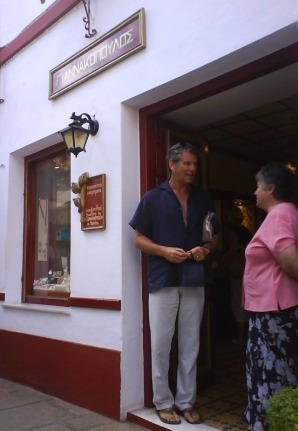I especially love the dwarf pencil sharpener, given to me by a
4 1/2-year-old Greek girl
Greeks have blessings for every occasion imaginable. Every holiday, every birthday, every name day…these are to be expected. But what about each new week, new month, weekend, even the three-day weekends? All are preceded by the word “good,” as in “Good week,” “Good month,” “Good weekend (Saturday-Sunday),” “Good three-day weekend.” The time of day determines the greeting, another blessing: “Good day (morning),” “Good mid-day,” “Good afternoon,” “Good evening,” and “Goodnight.” But it doesn’t end there. “Good appetite,” “Good time,” “Good rest,” “Good sleep,” “Good trip,” “Good vacation,” and “May you pass your time well (good).”
Did you recently purchase a new article of clothing? Then you will hear, “Meh yah!” (“With health!”) from the sales clerk. If you’re at a wedding and related to the groom or the bride, you will hear a blessing that means, roughly, “May they live!” (said in the same vein as Spock’s “Live long and prosper.”) The same at a baptism. The usual blessing for New Years, name days and birthdays is “Many years!” At birthdays, you may also hear, “May you live to one hundred years!” Basically, there is a blessing for every occasion imaginable.
The lovely part is that it is said with meaning and kefi (passion). You really do feel blessed.
Add to this that Greeks are generous to a fault. From the moment I landed on my first Greek island, I had all of my needs provided. My first Greek boyfriend provided me with a place to stay, transportation, clothes to wear, and food to eat. He also protected me from all of the other Greek men and introduced me to some of my closest Greek friends. And he wasn’t the only one. It was years before I paid for a single drink. Even today, twenty years later, I was not allowed to pay for my hot chocolate. The owner of the café also disappeared before I could pay him for my breakfast. When I approached him the next day, he said “tomorrow.” Did I ever pay him? We have both, long-since, forgotten.
I will never forget one meal on the touristy Sporades Island of Skiathos. Greece was in the middle of a two-month strike. Nothing was functioning. Even the electricity was on strike and would turn off, predictably, right around dinner time. The restaurants were scrambling to keep the food warm. A group of European tourists at the table next to ours was complaining loudly that their food was lukewarm, not hot. They continued to give the waiter a bad time. My girlfriend and I were cringing. The waiter was so relieved that we, too, didn’t yell at him that he kept bringing us little treats…first some fruit, then some yogurt with honey, then some ouzo, then Metaxa, then more ouzo. We had to finally decline his overwhelming generosity.
I remember some of my earlier days on the island of Skopelos. I have always stayed in the same neighborhood, which used to be home to several elderly women. It would take me hours to traverse the last twenty feet back, because each little grandmother would offer me coffee, then sweets, then nuts, then more sweets. Just today, a dear friend who functions as my mother-away-from-home, invited me to dinner. I apologized because I felt that my joining her was an imposition—I wanted to have dinner with her family, but I felt guilty that they couldn’t have a meal without me. She thought that I was apologizing because I could not join them—and told me not to worry, that she would invite me again soon when they were having something nice. I was too surprised to clarify.
In just three days of this current trip, I received two bowls of fresh grapes (from two different people), two plates of fresh figs, three meals, several free drinks, a large painted water jug, fresh eggs, nuts and two vases of fresh flowers. I turned down additional offers of several meals and drinks. I also received discounts on five different purchases. I remember my mother commenting that Greek generosity stems from their mythology of Gods traveling as visitors. “But,” I retorted, “These Greeks know that I’m not a God!
Each year when I prepare for my return trip I must purchase an additional bag in which to carry all the gifts that I have been given.—gifts which are usually heavy, large and breakable, if not perishable. (See: Greek Duffle Bag Contents-or-What the Heck is in This Thing?) And each year when I return home, I am struck by the generosity of the Greeks and, in comparison, our almost sterile American encounters. I am, frankly, shocked when an American stranger offers a blessing. The most we can hope for in California is, “Have a good day.” And I recall a handful of occasions that I was given the gift of a free cappuccino or pastry at my local coffee shop; each time was such an unexpected surprise that I remember each occasion in detail!
We can learn a lot from the practice of Greek blessings and generosity. How different our day and our world would be if we remembered to extend both to mere strangers! Because, you never know—they could be visiting Gods, disguised!



 RSS Feed
RSS Feed

